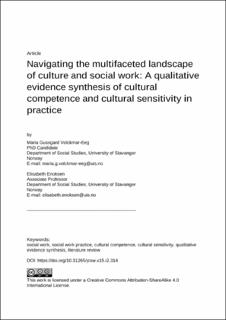| dc.contributor.author | Volckmar-Eeg, Maria Gussgard | |
| dc.contributor.author | Enoksen, Elisabeth | |
| dc.date.accessioned | 2021-04-28T15:01:32Z | |
| dc.date.available | 2021-04-28T15:01:32Z | |
| dc.date.created | 2020-12-15T17:36:49Z | |
| dc.date.issued | 2020-11 | |
| dc.identifier.citation | Volckmar-Eeg, M.G., Enoksen, E. (2020) Navigating the multifaceted landscape of culture and social work: A qualitative evidence synthesis of cultural competence and cultural sensitivity in practice, Journal of Comparative Social Work, 15(2), | en_US |
| dc.identifier.issn | 0809-9936 | |
| dc.identifier.uri | https://hdl.handle.net/11250/2740237 | |
| dc.description.abstract | Faced with increased global migration, there is a growing concern that social workers need more training in- and knowledge of culture and ethnicity. These understandings have come to influence research, education, practice, codes of ethics and organizational policy, constituting a multicultural discourse within the field of social work. Social workers are expected to have cultural competence, and exercise cultural sensitivity in their practice. However, a clear and consistent understanding of what it means to be culturally competent or culturally sensitive is missing, and there seems to be little consensus in how to define and apply these concepts, both within research and practice. The aim of this qualitative evidence synthesis is to synthesize what previous empirical research reports about social workers’ understandings and experiences when operationalizing the concepts into practice. Through data-based and a manual journal search, 12 qualitative empirical studies were included in the synthesis. Our analysis describes four main challenges in the studies’ efforts to operationalize the cultural concepts in social work practice: 1) Who to define as culturally diverse service-users; 2) What aspects of culture to consider in the encounters with culturally diverse service-users; 3) How to consider and approach these aspects of culture, and 4) the capacity to work in a culturally appropriate manner within the organizational context where this work is undertaken. The literature acknowledges these challenges to varying degrees. We summarize the four challenges in a model, and argue that the model can be useful in further awareness-raising, development and integration of our understandings of cross-cultural social work. By depicting the essential questions of who, what, how and where to employ the concepts into practice, we aim to assist scholars, practitioners and educators to help navigate the multifaceted landscape of culture and social work. | en_US |
| dc.language.iso | eng | en_US |
| dc.publisher | Stavanger, University of Stavanger | en_US |
| dc.rights | Navngivelse-DelPåSammeVilkår 4.0 Internasjonal | * |
| dc.rights.uri | http://creativecommons.org/licenses/by-sa/4.0/deed.no | * |
| dc.subject | sosialfag | en_US |
| dc.subject | sosialt arbeid | en_US |
| dc.subject | kulturell kompetanse | en_US |
| dc.title | Navigating the multifaceted landscape of culture and social work A qualitative evidence synthesis of cultural competence and cultural sensitivity in practice | en_US |
| dc.type | Peer reviewed | en_US |
| dc.type | Journal article | en_US |
| dc.description.version | publishedVersion | en_US |
| dc.rights.holder | Copyright (c) 2020 The Author(s) | en_US |
| dc.subject.nsi | VDP::Samfunnsvitenskap: 200::Sosialt arbeid: 360 | en_US |
| dc.source.journal | Journal of Comparative Social Work | en_US |
| dc.identifier.doi | 10.31265/jcsw.v15i2.314 | |
| dc.identifier.cristin | 1860226 | |
| cristin.ispublished | true | |
| cristin.fulltext | original | |
| cristin.qualitycode | 1 | |

